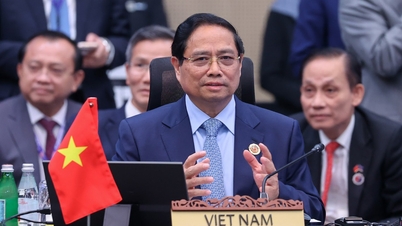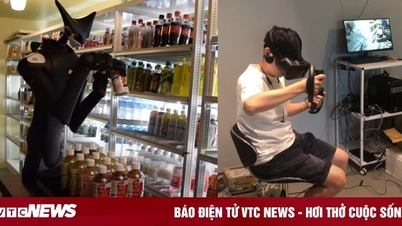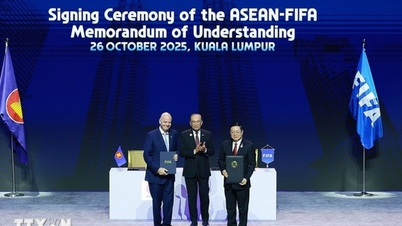Mobilint - a leading Korean technology company introduces a series of advanced AI chip and edge computing solutions, aiming to support Vietnam in digital transformation and smart infrastructure development. Mobilint's new technologies help optimize on-site data processing, reduce latency and save energy, suitable for areas such as smart transportation, manufacturing, healthcare and digital cities.
The Vietnam - Korea Digital Forum 2025 will mark the beginning of extensive technological cooperation between the two countries in the era of artificial intelligence.

“We are not just making AI chips, but developing the entire ecosystem – from hardware to software – to make AI more accessible, energy efficient and sustainable,” said Vice President Seongmo Kim.
Bringing three key products to the 2025 Forum
At the Vietnam - Korea Digital Forum 2025, organized by the Vietnamese Ministry of Science and Technology in collaboration with the Korea Information Technology Industry Promotion Agency (NIPA), Mobilint introduced three strategic products: MLA100, REGULUS SoC and MLX-A1 - demonstrating Korea's leading edge computing capabilities.
The MLA100 is a compact AI accelerator card that delivers 80 TOPS of performance on just 25W of power, delivering superior processing power while being much more energy efficient than traditional GPUs. It is suitable for edge data centers, factories, and smart transportation systems - areas that require real-time image and data processing.
REGULUS SoC is an AI chip that integrates CPU, NPU, ISP and codec in the same chip, achieving 10 TOPS of performance with only 3W of power consumption. With the ability to operate independently, REGULUS is ideal for robots, cameras, drones and IoT systems that need on-site AI processing.
The MLX-A1 is a complete edge computer, integrating the MLA100 on Intel, running Ubuntu Linux with a pre-installed SDK, helping businesses quickly deploy AI applications without complex infrastructure.
“Mobilint’s products are developed to solve the industry’s biggest problem – how to run powerful AI at the edge while still saving energy and costs,” emphasized Mr. Seongmo Kim.

Mobilint's MLX-A1 - an edge computer with integrated AI chip, ready for deployment in industry and smart cities.
Affirming the pioneering position of Korean AI semiconductors
Mobilint designed the entire NPU architecture and 'qb' SDK in-house, allowing it to deploy over 400 AI models without complex tuning. The synchronization between hardware and software allows Mobilint's chip to achieve high performance with 80% lower power consumption than conventional GPUs.
Along the way, the company has achieved many important milestones: in 2020, it made a global splash with its MLPerf AI performance results; in 2022, it launched the ARIES chip - the foundation for its edge AI product line; in 2024, it announced the REGULUS SoC, opening an office in the US; and in 2025, REGULUS won the CES Innovation Award, affirming Mobilint's pioneering position in the field of AI semiconductors.

MLX-A1 - Mobilint's next-generation edge computer, bringing AI processing power right to the application field.
Mobilint's technology has been applied in real projects in Korea and Asia such as Hyvision's automatic fault detection line or the smart traffic monitoring system in Anyang and Seongnam cities, contributing to improving the efficiency of urban management and operation.
Towards strategic cooperation in Vietnam
With a regional vision, Mobilint sees Vietnam as a strategic market in Southeast Asia, where digital transformation is growing strongly. “Vietnam is at a breakthrough stage in digital transformation. This is an ideal environment for edge computing technology - where artificial intelligence is deployed right on the field, helping the system operate more intelligently and economically,” said Mr. Seongmo Kim.
At this year's Forum, Mobilint hopes to cooperate extensively with Vietnamese telecommunications enterprises, system integrators and management agencies, through sharing technology, implementing PoC pilot projects and developing AI applications suitable for local needs.
In addition, the company aims to transfer technology, localize products and train Vietnamese engineers in the field of AI chip design and application, contributing to building the domestic semiconductor industry.
Source: https://vtcnews.vn/mobilint-doanh-nghiep-han-quoc-tien-phong-phat-trien-chip-ai-cho-ky-nguyen-so-ar973172.html


























![[Photo] Nhan Dan Newspaper displays and solicits comments on the Draft Documents of the 14th National Party Congress](https://vphoto.vietnam.vn/thumb/1200x675/vietnam/resource/IMAGE/2025/10/26/1761470328996_ndo_br_bao-long-171-8916-jpg.webp)









































































Comment (0)